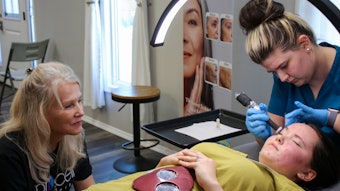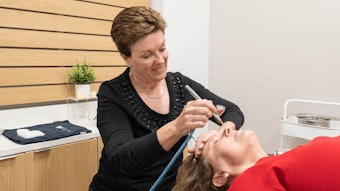
Great teams begin with hiring the right skin care professionals to care for your clients.
Apples, oranges—and peaches
A major shift has occurred in the skin care industry during the past few years; namely that professionals have been called out from the candlelit depths of the treatment room into the light to interact with the public. This means that successful skin care professionals now need a versatile array of skills. Today, everyone must see themselves as part of the sales team, with strong interactive and customer service skills in order to make their business profitable.
When reviewing résumés and interviewing candidates, identify assets in both the technical and people skill areas. Treatment techniques may be developed with training and practice, but people skills are fundamentally a matter of attitude. A great team member is genuinely interested in making a client happy, and will instantly shift her attention from whatever else is going on to do that.
This ability and willingness to be fully present in the art, craft and transaction of work as a skin care professional is one way to define passion, which is an overused word these days. It is not just being able to talk a good game during the interview—anyone with any smarts at all can do that. And it is not simply a dedication to the perfection of technique, although the profession requires hundreds and hundreds of hours of practice, and the patience to go with it.
The real peaches in your pick are those candidates who bring a strong core of technical skills, but most importantly know how to make people feel good. This includes their co-workers, as well. Give special consideration to candidates with résumés that demonstrate volunteer work involving direct service with people. Where people invest their unpaid time is a clear indicator of where their passion resides.
Tells that set off bells
Poker players spend their lives studying people’s microexpressions, also referred to as the “tell.” They analyze the tiniest nuances of movement and posture, because even the subtlest cues contain vast stores of information about the person’s character and thoughts.
Pay close attention to the body language of the candidate. If possible, allow her to wait in the reception area before you greet her, and observe her behavior from a slight distance. If your reception area has windows to the street, be outside when your candidate arrives and come through the front door; she won’t know who you are. Just watch for a few moments. Does she walk right up to the team? Does she extend a hand in greeting? Does she make immediate eye contact, and hold it? Does she engage? Smile? Did she arrive a few minutes early? If the answers to these questions are mostly “no,” those tells should set off bells—and red flags.
Command performance
Consider bringing other team members into the interview process or asking candidates to perform a basic treatment on the spot. This provides an instant read into her capacity to cope with the element of surprise under pressure.
Remember that training must be instructive, not corrective. Education and support can definitely refine a team member’s skills and enhance her overall value to the team, but remedial training is always an act of desperation. Employees need to have their hearts—their passion—in the game to truly flower as part of your long-term team. Identifying winners requires precision and intuition, but the extended benefits are always worth it.











